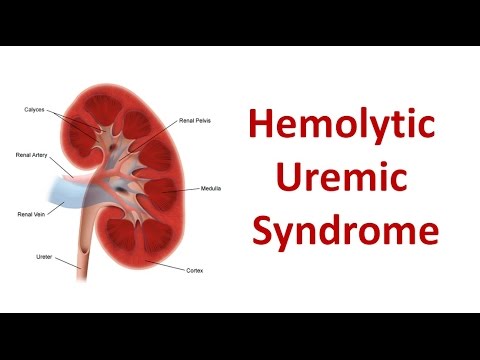Hemolytic Uremic Syndrome (HUS) Causes, Symptoms, Diagnosis and Treatment

What is Hemolytic Uremic Syndrome?
Hemolytic uremic syndrome, abbreviated HUS, is a disease characterized by hemolytic anemia (anemia caused by destruction of red blood cells), acute kidney failure (uremia), and a low platelet count (thrombocytopenia).
It predominantly, but not exclusively, affects children.
Adults also may develop hemolytic uremic syndrome after an E. coli infection, but the cause also may be certain medications, other types of infections, pregnancy or it may be unknown.
Causes of Hemolytic Uremic Syndrome:
In children, the most common cause of HUS is an infection with a specific strain of E. coli, usually the strain known as O157:H7.
- coli may be found in:
- Contaminated meat or produce
- Swimming pools or lakes contaminated with feces
In adults, HUS is commonly caused by other factors which include:
- The use of certain medications, such as:
- quinine (an over-the-counter muscle cramp remedy)
- chemotherapy drugs
- the immunosuppressant medication cyclosporine
- Neoral
- Sandimmune
- anti-platelet medications
- Pregnancy
- Certain infections, such as:
- HIV/AIDS
- an infection with the pneumococcal bacteria
- Genes, which can be a factor because a certain type of HUS — atypical hemolytic uremic syndrome — may be passed down from one’s parents
Those most at risk of developing hemolytic uremic syndrome are:
- Children under 5 years of age
- People who have certain genetic changes that make them more susceptible
Symptoms of Hemolytic Uremic Syndrome:
The following signs and symptoms are exhibited by those affected by HUS:
- Bloody diarrhea
- Vomiting
- Abdominal pain
- Pale skin tone
- Fatigue and irritability
- Fever, usually not high and may not be present at all
- Blood in the urine
- Small, unexplained bruises or bleeding from the nose and mouth
- Decreased urination or blood in the urine
- Swelling of the face, hands, feet or entire body
- Confusion
- Kidney failure
- Thrombocytopenia (low level of platelets)
- Destruction of red blood cells
- Hypertension
- Elevated LDH
- decreased haptoglobin
- elevated creatinine
- Brain dysfunction
Diagnosis of Hemolytic Uremic Syndrome:
The following tests help confirming the diagnoses of HUS:
- Blood tests.
- Blood tests may reveal a low platelet count, low red blood cell count or a higher than normal level of creatinine.
- A blood sample can also be used to determine if your red blood cells are damaged.
- Urine test, to test for blood in your urine.
- Stool sample, to test for the presence of bacteria.
Treatment of Hemolytic Uremic Syndrome:
Treatment of HUS may include the following:
- Fluid replacement.
Lost fluid and electrolytes need to be carefully replaced because the kidneys aren’t removing fluids and waste as efficiently as normal.
- Red blood cell transfusions.
Red blood cell transfusions, given through an intravenous (IV) needle, may help reverse rapid heart rate, fatigue and shortness of breath.
- Platelet transfusions.
- Plasma exchange
- Kidney dialysis.
By : Natural Health News




